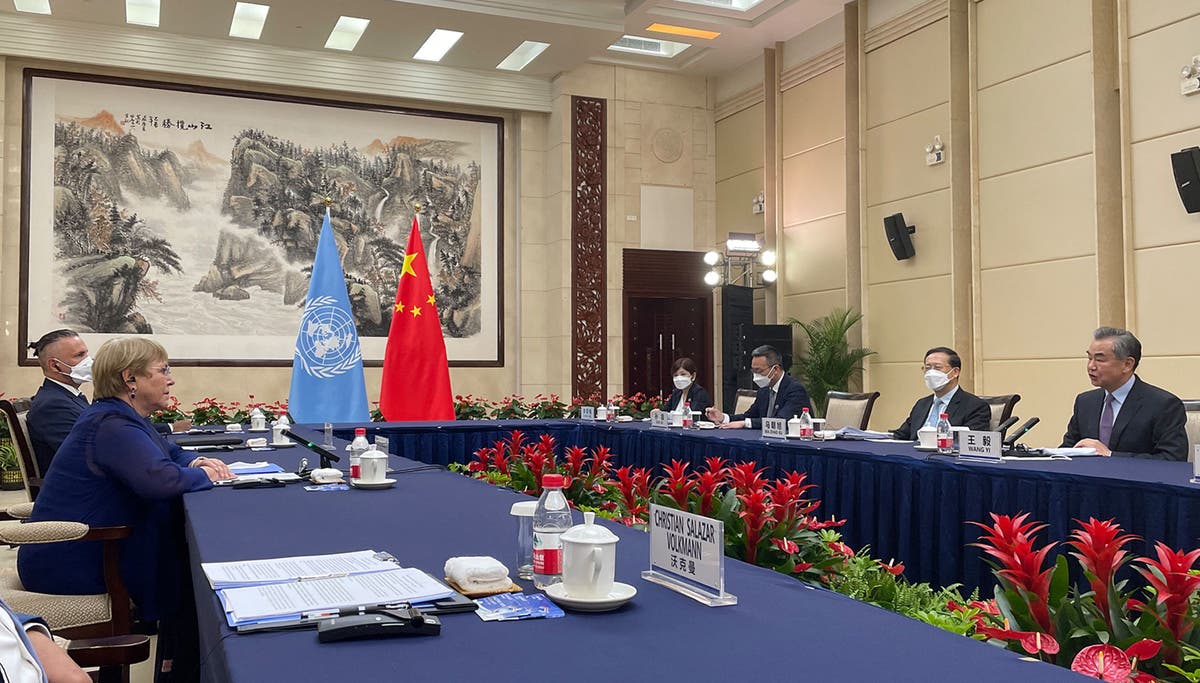
China has said that it is ready for “constructive cooperation” with the United Nations as human rights commissioner Michelle Bachelet arrived in Guangzhou this week for the first UN visit of its kind in 17 years.
Ms Bachelet met Chinese foreign minister Wang Yi as she started her six-day visit, which is due to focus on allegations of human rights abuses against Muslims in China’s Xinjiang region.
Mr Wang said that he hoped the UN official’s visit will enhance mutual understanding and cooperation and avoid “confrontation”, according to China’s Xinhua news agency, in comments that will do nothing to ease critics’ fears that the fact-finding mission will end up being a whitewash.
“Multilateral human rights institutions should become a platform for cooperation and dialogue, rather than a new battlefield for division and confrontation. China is ready to carry out constructive cooperation with the Office of the High Commissioner for Human Rights (OHCHR) based on mutual respect and on an equal footing,” the minister was quoted as saying.
Ms Bachelet told the minister that she was looking forward to exchanges with many different people during her visit, particularly government officials, business leaders, academics, students and members of the civil society working on human rights and other social and economic issues, reported the Associated Press.
“While we will be discussing sensitive and important issues, I hope this will help us to build confidence and enable us to work together in advancing human rights in China and globally,” she added.
The visit comes as a breakthrough for the UNHCR, which has been pursuing negotiations with Beijing to schedule a trip since September 2018.
The Xi Jinping-led government granted permission for the visit in January on the condition the trip should be “friendly” and not framed as an investigation.
Human rights groups have for years been accusing China of systemically oppressing Uyghurs, an ethnic Muslim minority in the north-western region of Xinjiang, and the start of Ms Bachelet’s trip has coincided with the release on Tuesday of a major new cache of documents relating to the involuntary detention of Uyghurs.
Concerns have been raised about widespread abuses, including mass incarceration, forced labour, torture and sexual assault of more than a million Uyghurs in detention centres in the region.
China has denied these allegations of abuse, and after initially denying the existence of a network of camps in the region now describes them as voluntary reeducation centres.
Mr Wang called for mutual respect during the visit and “avoiding politicisation of human rights and adhering to fairness and justice and avoiding double standards; seeking truth from facts and avoiding disconnection from national conditions; upholding openness and inclusiveness and avoiding creation of camp confrontation”.
After Guangzhou, Ms Bachelet will travel to Kashgar, once a stop on the Silk Road, and Urumqi, the Xinjiang capital.
Foreign media have been barred from accompanying the UN official and it’s unclear who she will meet and how much access she will be granted throughout her visit. China has said the visiting delegation will stay in a Covid bubble, similar to the precautions taken around the Beijing Winter Olympics in February.
Meanwhile, photographs and a huge cache of data hacked from police computer servers in the region revealed new details of China’s highly secretive system of mass incarceration in Xinjiang, as well as a shoot-to-kill policy for those who try to escape, according to reports published on Tuesday by media outlets including BBC News.
The release appears in part to have been timed to coincide with Ms Bachelet’s visit, withs critics having raised concerns that it would otherwise be used as propaganda by the Chinese government and may not yield any significant gains.
Ziba Murat, an overseas Uyghur, said that hopes for meaningful outcomes from the UN official’s visit remain limited.
“We hope that High Commissioner Bachelet will not let her visit be used as propaganda. At least she should fulfil the mandate of her office. This trip has to be transparent in where she goes and who she talks to, and to demand access to prisoners of conscience like my mother, Gulshan Abbas, who have been held hostage by the [Chinese Communist Party] since September 2018,” she told Al Jazeera.
Li Xuewen, a dissident writer and independent political researcher based in Wuhan, told South China Morning Post that he had little hopes from the visit.
“I expect nothing from her and the UN, due to their … inaction on human rights in China over the years. Her trip to China will have no results and no impact, [leading to] no structural impetus or changes, and may only help a few well-known cases [of dissidents],” he was quoted as saying.








